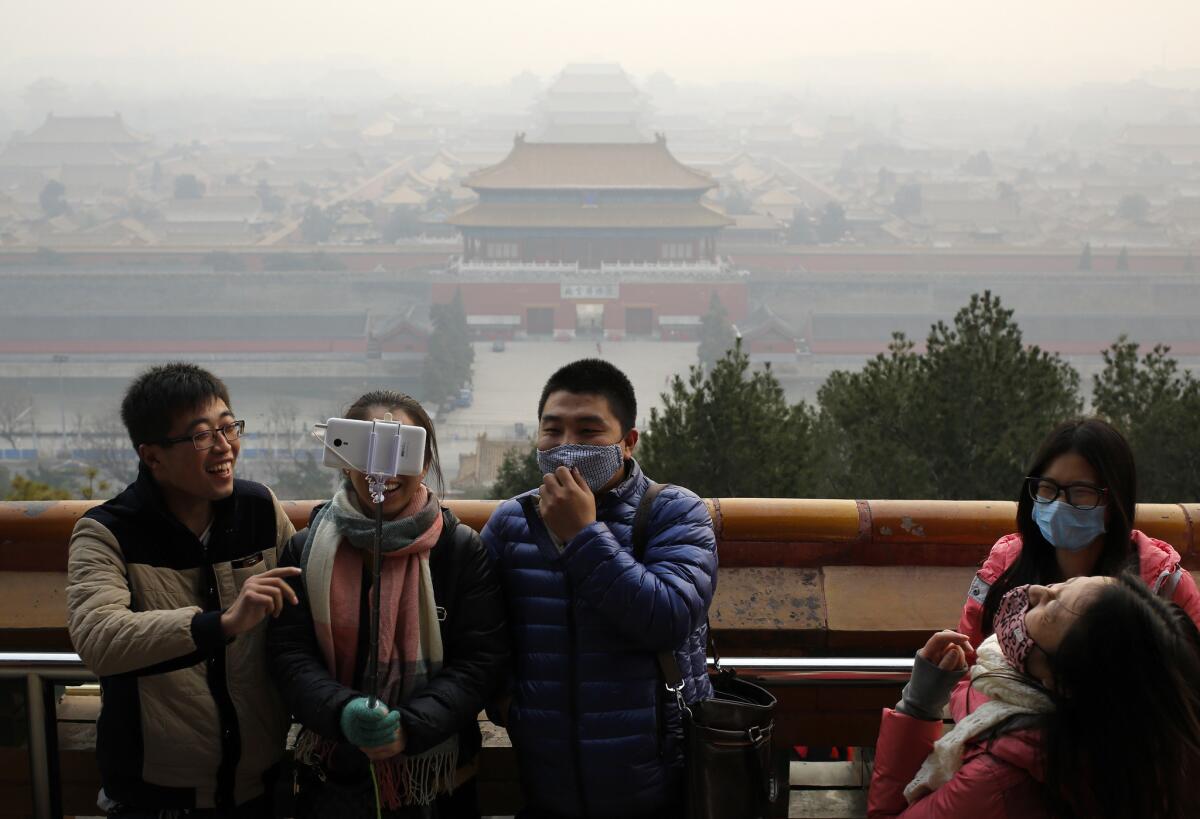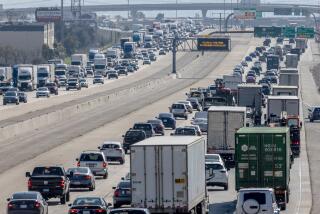On the Ground: I knew Beijing’s bad air was killing me slowly. But is it making me fat too?

Visitors, some wearing masks to protect themselves from pollutants, take a selfie at Jingshan Park in smoggy Beijing on Dec. 7.
- Share via
Reporting from Beijing — In the two years since I moved to Beijing, I thought I had heard quite enough, thank you very much, about the perils of being exposed to the Chinese capital’s chronically smoggy skies.
There were the studies linking pollution to lower birth rates, and reports about the explosion of lung cancer cases, and of course the shocking research indicating life expectancy is 5.5 years shorter in northern China than in the south thanks to its dependence on coal-fired heating.
But then last week came perhaps the cruelest blow: A new scientific article suggesting that Beijing’s smog could be making me fat.
It’s undeniably true that since being dispatched here, I’ve had to loosen up the old belt buckle by a couple of notches. I’ve attributed my additional adipose to a variety of factors: the preponderance of carb-tastic, oil-soaked Chinese cuisine; the hazy days that discouraged me from jogging outside; the frequent baijiu-soaked outings with Chinese acquaintances and late-night bar sessions with fellow reporters; the general stress and sleep deprivation of being a foreign correspondent on call 24/7/365. Plus, let’s face it, being over 40.
Yet I’m hardly alone in packing on the pounds. My roommate recently complained she’d become 10 pounds heftier in her two years in Beijing. Another friend said she’d gained a “freshman 15.” All this despite critical shortages of decent cheeses, ice cream and bacon.
And it’s not just us expats going super-size. A 2014 study in the Lancet found that 28% of Chinese adult men and 27% of women are overweight or obese, up from almost none 30 years ago. China now has more fat people than any country besides the United States.
So along comes the March issue of the Journal of the Federation of American Societies for Experimental Biology, featuring a study that put pregnant rats and their offspring into two chambers in Beijing, one exposed to outdoor air and the other with a filter that removed most of the particulate air pollution. The two groups were fed the same diet.
The results were eye-popping: At the beginning of the experiment, there was no difference in body weight between the pregnant rats in each group. But after 14 days, the rats in the polluted air were 7% heavier, and by day 19, they were 15% chunkier. Their lungs were 25% heavier than the control group, indicating serious inflammation, and likewise their livers were weightier by 16%.
Their LDL cholesterol (that’s the “bad” kind) was 51% higher, their triglycerides were 46% higher, and their total cholesterol was 97% higher than the rats enjoying the filtered air.
As if that wasn’t bad enough, their insulin resistance level, a precursor of Type 2 diabetes, was higher than their counterparts inhaling air cleaned of particulates.
Join the conversation on Facebook >>
These rats’ babies showed similar issues: Eight weeks after birth, the pollution-exposed female rats were 10% fatter than their clean-air counterparts, while males were 18% chubbier.
Yowza.
I got in touch with Junfeng “Jim” Zhang at Duke University, one of the lead authors of the study. Jim, I said, could it be that it’s Beijing’s air, and not my shameful lack of willpower, that’s to blame for my Chinese spare tire?
“Biologically, you have evidence,” he said. (Jim, did I mention I love you?)
Although the primary factor in weight gain is still eating too much and exercising too little, he said, pollution is a serious behavioral and biological factor.
“Think about how many days children [in Beijing] are advised not to go outside and exercise” because of pollution, he said. “That contributes to weight gain, and then there’s this evidence that you inhale these things and it gets your body messed up, with the fat metabolism and sugar metabolism. That will slow things down, and energy will accumulate in the body.”
OK, I said, but how is all this really working in my body?
“The particles go to the lungs, and the lung will get an impact; we measure this as lung inflammation,” he explained. “The inflammation of the lung spills over; think of this as chain reaction. The lung is not isolated, it’s related to the systemic circulatory system. We measure molecules in blood and we see whole body inflammation from the dirty air exposure.
“Then we look into the fat tissue.... Fat tissue also shows a higher level of inflammation. That can directly translate into body weight gain” as more lipids are deposited into fat tissue.
Adding insult to injury, metabolic function — basically how efficiently we break down our food and turn it into energy — is also affected.
“We saw that in the dirty-air rats, it increases their LDL — that’s bad, because it increases the fat level in the bloodstream, and also decreases insulin metabolism, which is related to the sugar metabolism; you don’t want too much sugar accumulating in the body,” he said. “So dirty air causes more fat to accumulate in the body, and also decreases sugar metabolism, which is directly related to weight gain.”
I called Marie Ng, the lead author of the Lancet study and a former University of Washington researcher who now works at IBM’s Watson Health, to see what she thought about the fat rats.
“It’s a very interesting study,” she agreed, though she cautioned that “generalizing from rats to humans, we have to be careful.”
“Obesity is really complex,” she added, noting that a host of factors contribute to the condition, from increased wealth and increasingly sedentary lifestyles, to the introduction of fast food and the way pollution limits outdoor activities.
Still, she said, it is curious that South Korea and Japan have industrialized and modernized even more than China has but have not experienced the same explosion of obesity as China.
“There might be something unique about China,” she said, “but I still have not found a study that can pinpoint certain aspects of it.”
Whether air pollution might be that “X Factor” remains to be seen. In the meantime, said Zhang, research indicating that smog might make you fat might help persuade heretofore recalcitrant Beijing residents to don masks or install air purifiers in their homes and offices.
“We know air pollution is bad for lungs… but there are people who say, ‘I’m tough, maybe I’m even a smoker, why should I worry?’ But if you say air pollution will make you fat if you are continuously exposed to it, maybe people will respond to that. Of course, cancer is more threatening, but to some people, appearance means a lot.”
As for me, I’ve already decided to see whether cutting back on smog can help me slenderize.
So pass me a new mask, and crank up the air purifier to 11. Swimsuit season is just around the corner.
Follow @JulieMakLAT for news from China
NEWSLETTER: Get the day’s top headlines from Times Editor Davan Maharaj >>
ALSO
Murder, torture, drugs: Cartel kingpin’s wife says that’s not the ‘El Chapo’ she knows
Kerry says Syria is close to a ceasefire, but bombings claim dozens of lives
A new force in drug trafficking reaches Tijuana
More to Read
Sign up for Essential California
The most important California stories and recommendations in your inbox every morning.
You may occasionally receive promotional content from the Los Angeles Times.














